Fill the gaps with the verb in brackets using either to be going to or will form of the future tense.
Sally: There is no paper left!
Betty: Oh, I (to get) some from the shop.
The population of Valencia (to reach) 2 million by the year 2010, the report says.
Boss: I told you to type this document today.
Employee: Sorry, Mr. Smith, I forgot. I (do) it after lunch.
Sally: Why don't we meet for coffee on Friday morning?
Willy: Sorry. I can't. I (to have) a job interview then.
"Tomorrow (to be) a bright and sunny day everywhere in Spain, except in Madrid," said the weatherwoman.
Look at that big black cloud. I think it (to rain).
Sally: What are your plans for the week-end?
Betty: Brad Snow, my employer phoned. I (to get ready) for our annual meeting.
Betty: Have you booked the flights yet?
Sally: Don't worry. It's all organized. I (to go) to the travel agent's tomorrow morning. You (to go) certainly to your business trip.
In the future people (to work) less.
If we miss the bus, we (to take) a taxi.
Put the verb into the most suitable form with future meaning, Present progressive or Present simple.
We (to have) a corporate party next Saturday. Would you like to come?
I (not to go) away for my holidays next month because I haven’t got enough money. They haven’t paid me holiday pay yet. (You/to go) away?
Our first job interview this afternoon (to start) exactly at 3:30.
George, is it true that you (to work) overtime next week?
My seasonal work (to start) May, 25 and (to end) October, 25.
What time the (next shift/to end)?
Ann, we (to go) to town. (You/to come) with us?
Don’t make any plans I (to surf) the Net tonight.
Our after-hours activities usually (to start) after 8 p.m.
I (to look for) a position of a banker.
Put the words into the correct order paying attention to the usage of tenses denoting future actions.
Doing/I/ course paper/am/ with/ in the evening/ my father.
Company /in our /seasonal overtime/ /starts/ May, 1.
Going/a new /vacancy/I am/to find/ my sister-in law/for.
You/to place/where/going/your/are/new/ job advertisement?
Arrive/your employer/does/when?
Colleagues/ for Madrid/are/my/in the next few days/leaving.
Become/next year/will/I/a good specialist.
With/Playing/our partners/volleyball match/are/tonight/we.
Is/to do/ironing/nobody/the/going.
Having/friends/we/for dinner/are /tonight.
Open the brackets paying attention to the usage of tenses denoting future actions (negative/question/affirmative forms).
The meeting (to start) at 10 o’clock.
We (to discuss) our project on Monday.
The employer (to plan) a series of interview with the applicants.
What you (to do)? I (to surf) the net.
We (to supply) you with all necessary equipment tomorrow.
The train (not to arrive) at 6 p.m. It goes behind the schedule.
Your working hours (start) at 8 a.m. and (to end) at 5 p.m. Please, be punctual, tomorrow (to be) your fist time at work.
(to go) anywhere this week? No, fortunately I haven’t got any business trips.
You (not to sell) your car, right? It is new!
He (to join) us later, don’t worry.
SPEAKING
Role-play the following situation.
Student A: Interview candidate
You have applied for a holiday job as a waiter at a local fast food restaurant. You are well qualified for the job and have some experience of this kind of work. Soon after the interview has begun, you change your mind about the job. You decide you are no longer interested. Do and say whatever is necessary to make sure you do NOT get the job.
Student B: Interviewer
You are interviewing applicants for a job in your fast food restaurant. You have interviewed several people already, but found no one suitable. Soon after the beginning of the interview with A, you decide he/she is the right person for the job. Do everything possible to make the interview a success.
WRITING: CURRICULUM VITAE
Read Adam Hall’s Curriculum Vitae (CV).
Date of birth:
Address:
Tel.:
Email:
|
25 February 1990
25 Victoria Road, Birmingham B19 2ZK
01218953 9914
adhall@interserve.net.uk
|
Profile
|
A highly-motivated, well-travelled, and creative graduate with practical work experience in both sales and TEFL4 teaching. A 4-month postgraduate residency at the Biosphere 2 Center, Arizona, has given me wide-ranging knowledge of, and insight into, environmental problems and ways of presenting them to the public.
|
Education
|
1998-2002
2002-2006
July, 2004
|
King Edward's School, Birmingham
0 Levels5: Art, Biology, Chemistry, English, French, Geography,
History, Maths, Spanish
A levels:6
Art A
Environmental Studies A
Chemistry B
Spanish B
Leeds Metropolitan University
BA7 Environmental Studies: 2:1
Academy School of English, Leeds Cert CELTA
|
Work experience
|
April 1999 – July 1999
January 2002 - May 2002
|
Weekend sales assistant, Kings Norton Garden
Centre, Birmingham
TEFL tutor, JA School of English, Katowice, Poland
|
Other information
|
September 2003
December 2003
May 15-16,2004
June 20-24, 2004
|
4-month residency at the Biosphere 2 Cent
Arizona, USA
Co-presented 'No smoke' at the Bretton Hall Sculpture Park, University of Leeds. An installation which explored the environmental implications of major forest fires, both natural and man-made.
Co-presented 'Time microscope' at the Covent Garden Flower Festival. An installation which explored different ways of presenting information about the natural world
|
Interests
|
My main interest outside work, although related to it, is travel. In 19— I took part in a school expedition to the High Atlas mountains in Morocco, and produced a video of the trip. In my gap year I travelled extensively in South America, again documenting the trip by means of sketchbooks and video. I also enjoy World Music, particularly that from countries I have visited, and play the guitar
|
References
|
Prof. T.N- Fagin
Department of Environmental Studies
Leeds Metropolitan University
LS23RX
|
Dr Elizabeth Gordon
Principal
JA School of English
Ulica Czysta 14
Katowice
Poland
|
B. Answer the questions.
Where did Adam study environmental problems?
What did he do while he was in Poland?
Who is Dr Elizabeth Gordon?
What do you think Adam's main interest is?
Where did Adam graduate from?
What commercial experience has he had?
C. Write a CV to attract employers and make them want to employ you as an Economist of Sales Department to a Coca-Cola company. Remember that the perfect CV should be:
Well-structured
Short, simple and clear
Easy to read and professional looking
|
Suitable to the job and the employer
Focused on the results not simply competency
Free of unnecessary details
|
Without spelling and punctuation errors
Grammatically perfect
Not your hobbies and interests unless they
demonstrate relevant job qualities
One or two pages maximum
|
WORD FILE
Unit 1 Module 3
|
advertisement
after-hours activities
attitude to smth
available (jobs)
colleague = co-worker
deadline
employment agency
in advance
majority of
qualifications
skills
smart (clothes)
to criticize
to get involved in (office gossip)
to keep doing smth
to look approachable
to make a good/strong impression on smb
|
to make eye contact
to make personal calls
to match smth e.g. qualifications
to take advantage of
to trust
to watch the things you say
to work out
accurate
ambitious
cautious
conventional
convincing
demanding
dynamic
efficient
experienced
honest
|
nervous
obedient
organized
patient
polite
predictable
punctual
relaxed
reliable
responsible
secure
self-confident
sensitive
sincere
systematic
tidy
tolerant
trustworthy
|
UNIT 2
NATIVE LAND
Module 1 Russia
PREVIEW
1 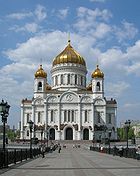 2 2 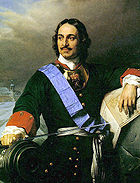 3 3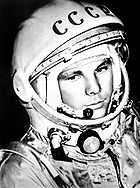 4 4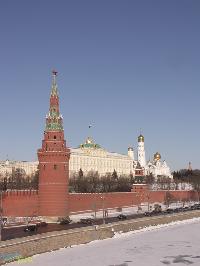
 5 5 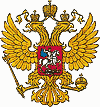 6 6
What do you know about Russia? Match the above pictures 1-6 with descriptions a) – f). What information can you give about the pictures?
a) The Cathedral of the Redeemer d) Peter the Great
b) The Red Square e) Coat of Arms of the Russian Federation
c) The flag of Russia f) First Russian cosmonaut
SAYING DATES
Years
|
Ordinal numbers
|
1984 nineteen eighty four
2010 two thousand and ten
|
1st first 2nd second 3rd third
4th fourth 5th fifth
|
Dates
|
3rd April 1998 (BrE) the third of April, nineteen ninety eight
3 April 1998 (BrE) April the third, nineteen ninety eight
April 3, 1998 (AmE) April third, nineteen ninety eight
|
New year is
Victory day is
Women’s day is
Independence day is
Christmas is
Day of Knowledge is
Day of the defender of Motherland is
|
on 9th May
on 1st September
on 7th January
on 23rd February
on 31st December
on 12th June
on 8th March
| There are many national holidays in Russia. Match the dates with the holidays.
HISTORY OF RUSSIA
Use the dictionary to find the meaning of the following words:
to found/to establish, to destroy, to rule, efforts, to invade, to divide into.
Can you say what these dates mean in the history of Russia? Use the dates to complete the sentences below.
-
862
988
1240
1552
|
1812
1762 to 1796
30 December 1922 27 May, 1703
|
on 22 June 1941
on 7th November, 1917
in December 1991
|
Tradition says in … the Viking Rurik came to Russia and founded the first Russian dynasty in Novgorod.
Vladimir “the Saint” became Christian in...
In …, Kiev was destroyed by the Mongols.
After the final battle of Russo-Kazan Wars in ... Ivan IV (Ivan the Terrible) transformed Russia and Tatar khanates into a multiconfessional state.
Tsar Peter I of Russia founded Saint Petersburg on …as the capital of the Russian Empire.
Catherine II (Catherine the Great), who ruled from …, continued the efforts to establish Russia as one of the Great Powers of Europe.
Napoleon’s efforts to invade Russia failed in ….
On 7th November …Vladimir Lenin headed the Bolshevik Revolution.
After victory in the Civil War, the Russian SFSR together with three other Soviet republics formed the Soviet Union on ….
On …, Nazi Germany invaded the Soviet Union that was the beginning of the Second World War.
The USSR was divided into fifteen independent republics….
LANGUAGE SKILLS: SHOWING LACK OF CERTAINTY & SURPRISE
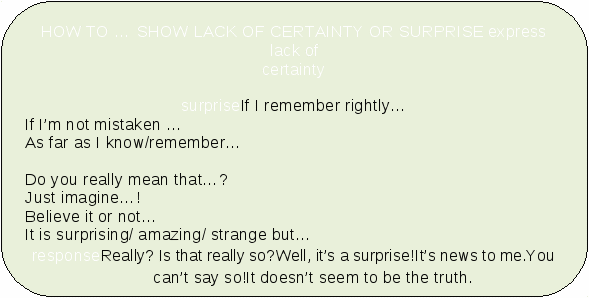
D. Make up short dialogues expressing lack of certainty and surprise. Use prompts given below.
e.g.If I remember rightly, Vladimir Lenin studied in Kazan.
Really? It’s news to me. When was it?
1) There are more than 200 holidays in Russia and only 7 are state ones!
2) In 1240 Kiev was destroyed by the Mongols.
3) The first animal in space was a Russian dog, Laika.
4) Viking Rurik founded the first Russian dynasty in Novgorod.
5) 13 cities in Russia have population over 1 m.
6) The USSR was divided into fifteen independent republics.
7) The Russian Federation is home to as many as 160 different ethnic groups.
SAYING NUMBERS
|
Numbers
|
100 a/one hundred
1000 a/one thousand
1 000 000 (1m ) a/one million
3 000 000 000 (3bn) three billion
|
Bigger numbers
|
 3 560 three thousand five hundred and sixty (BrE) 3 560 three thousand five hundred and sixty (BrE)
sixty (AmE)
 598, 374 five hundred and ninety-eight thousand, three hundred and forty- 598, 374 five hundred and ninety-eight thousand, three hundred and forty-
seven(BrE)
ninety-eight thousand, three hundred forty-seven(AmE)
|
Decimals
|
Vulgar fractions
|
16.5 sixteen point five
17.38 % seventeen point three eight percent
0.185 (nought) point one eight five
|
1/8 a/one eighth
3/8 three eighths
1/2 a/one half
3/4 three quarters
20/83 twenty over eighty three
| |
 Скачать 18.07 Mb.
Скачать 18.07 Mb. 2
2  3
3 4
4
 5
5  6
6 


